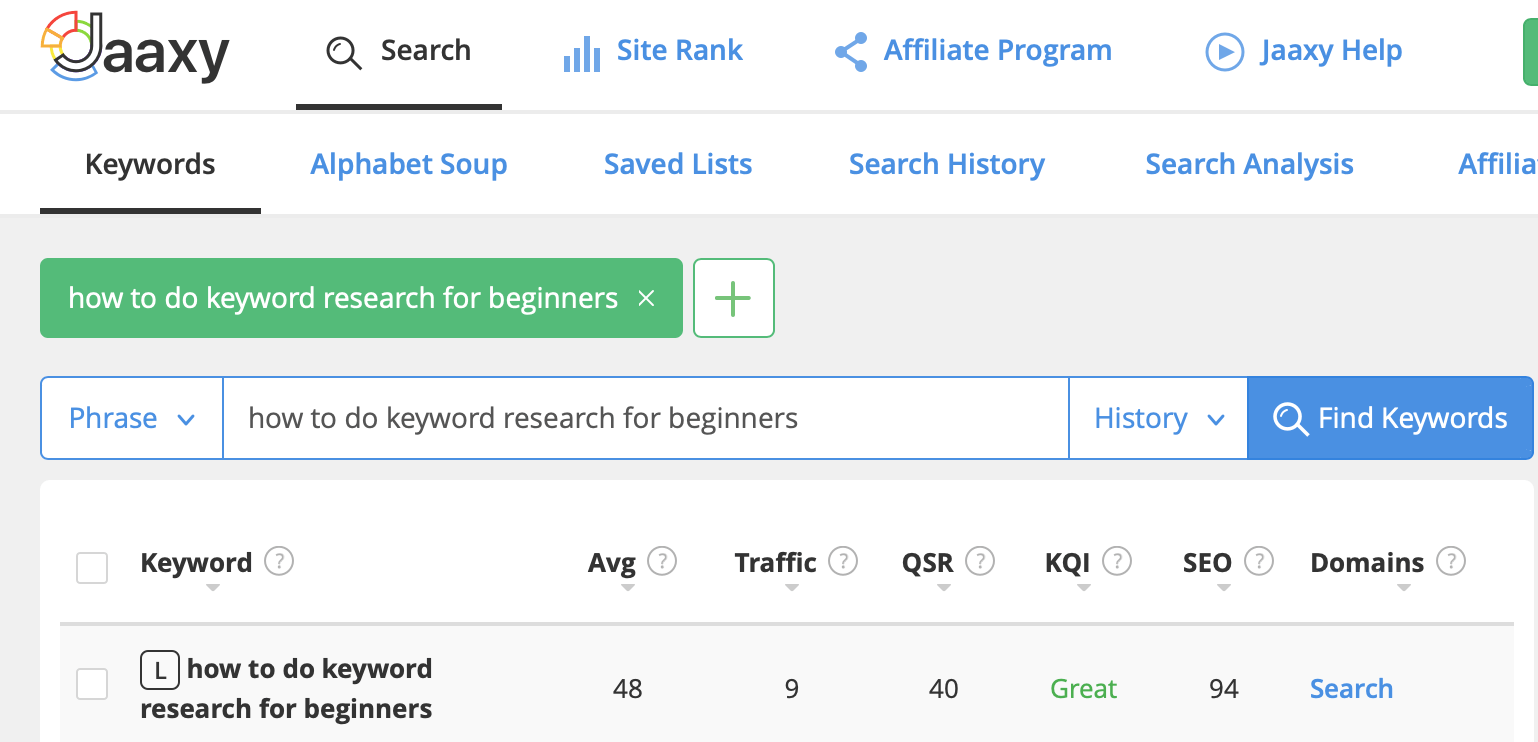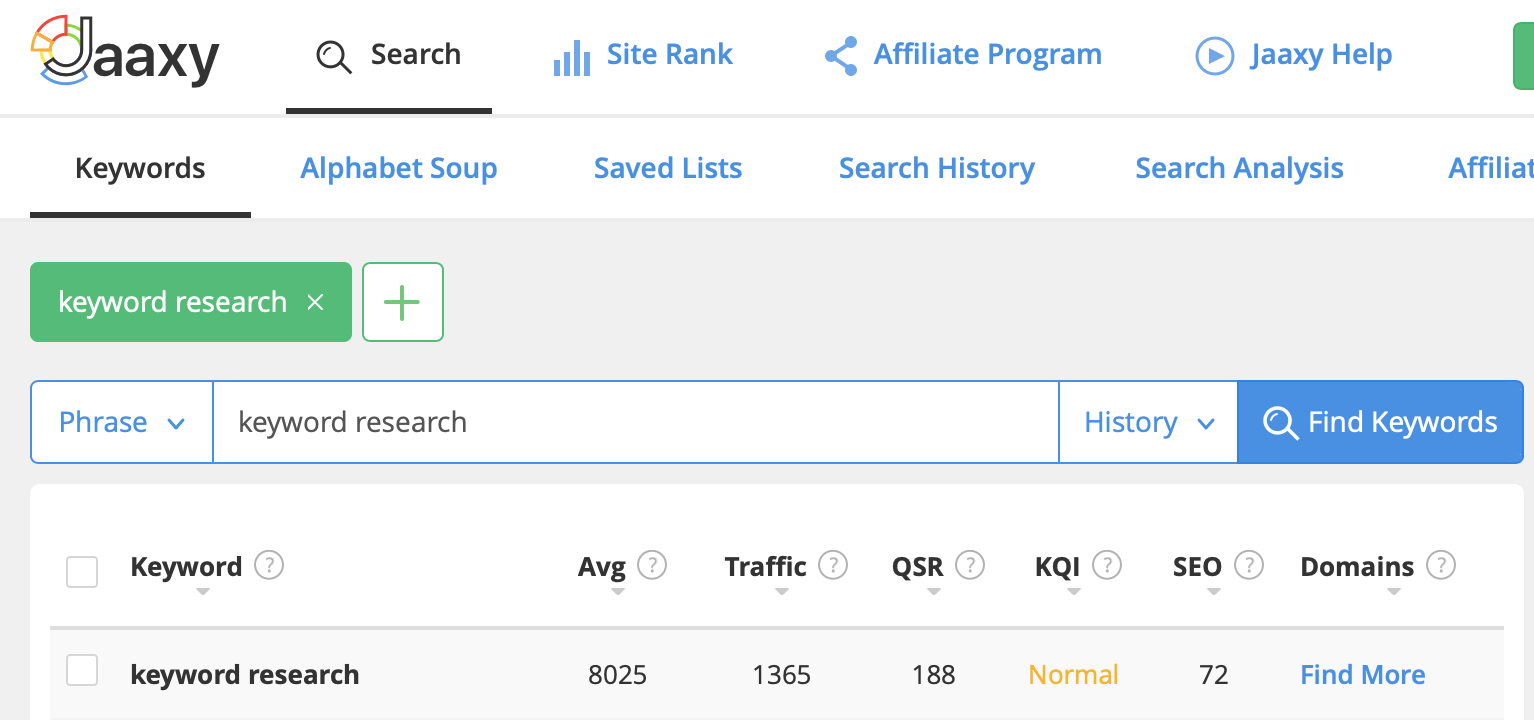
Keywords are the words or phrases that people type into search engines to find what they are looking for.
By using these keywords in the title of your post or article, search engines will be able to match the web page that contains your article with the pertinent search query.
This article will explain how to do keyword research for beginners.
Why Is Keyword Research Important
Without keyword research, you won’t know what words or phrases people are using to make searches for what they are looking for.

You may know what people are looking for – but if you don’t match your title to these searches, then you risk the search engines not picking up on the fact that you article is relevant to the said search.
For example – if you have an article about how to bake a cake… and the title of your article is ‘an interesting read’, then chances are that the search engines are not going to associate your article with baking a cake when someone inputs that as a search query.
Equally, if the title of your article is ‘how to bake a cake’ – there are going to be a great deal of other websites with that exact title and the chances of you ranking high in SERP (search engine results page) will not be great.
So you need to research the keyword that will allow search engines to link your article to search queries relevant to it, but also that are not so common that too many other websites will be using the exact same keyword…
So How Do I Find The Right Keyword?
There is a term in keyword research called ‘the low hanging fruit keyword’… basically, this is a low competition keyword.

Like a fruit tree, it is the fruit that is typically smaller (equivalent to getting less traffic), that has more abundance. There are many more of them and they have far less competition, because most people naturally compete for the “larger” fruit at the top of the tree (the high traffic keywords).
There are keyword research tools that will allow you to find the best keywords to use in your articles, one of these tools is a platform called Jaaxy.
Jaaxy
As mentioned above, it’s best to use keywords that have low competition (low hanging fruit keywords) – this is because the one’s with high competition are too difficult to rank high for… you’ll be competing with hundreds of other websites for page one on Google and that’s going to be tough.
But if you choose keywords that don’t have that many competing websites for those exact keywords, then it will be much easier to find your way to that coveted position on page one…
Using the Jaaxy platform – you input keywords that you may want to use as the title of your article or post and Jaaxy will tell you how many competing websites are using those exact keywords and the chances of your article ranking on the first page of search engines for those keywords.
Ideally you’ll want to choose keywords that have a QSR (Quoted Search Results) of less than 100.
QSR
QSR is the number of competing websites ranked in Google for the exact same keywords.
Take for example the title of this post… “How To Do Keyword Research For Beginners” – according to Jaaxy 40 other websites use this exact phrase to rank for.

Whereas if I’d used the title “Keyword Research” – 188 other websites use this phrase to rank for… you’d get a lot more traffic for this keyword if you were on page one of Google, but getting to page one would be mighty difficult in this case.

But for the title I have used, it will be a lot easier to get to page one… granted, you’ll have far fewer visitors per month (9 compare to 1365) – but at least you’ll have visitors… because if your post is sitting on page 10 of Google, I guarantee that you’ll have zero visitors from people searching for what you have to offer.
In the images:
- Avg refers to the average number of searches that keyword receives per month.
- Traffic refers to visits to your website if you achieve first page rankings in the search engines.
- QSR refers to the number of competing websites ranked in Google for the exact same keywords.
- KQI stands for Keyword Quality Indicator – green is great, yellow is OK and red is poor.
- SEO is a score based on traffic and competition – the higher the score, the more likely you will rank for this keyword on the first page (scale of 1-100, higher = better).
- Domains allows you to search for domains that are related to the inputted keyword.
Only Nine Visitors Per Month!
Now you may be thinking that nine visitors per month is not a lot… and it isn’t, but if you have many posts on your websites then it will add up – say you have 100 posts, each targeting a low competition keyword… and say on average, each of those keywords receives 10 visitors per month – that’s 1000 visitors to your website from search engines every month!
Conclusion
As with anything in business, research is essential and researching the title of your post is no different…

Keyword research is an essential part of SEO and will allow you to precisely know which words will be most effective in getting you to that sought-after place on page one of Google and other search engines.
Jaaxy is one of the best platforms out there for keyword research and managing all aspects of your keyword, competition and market research.
You can try Jaaxy for free here.
If you would like to learn more about how to grow and sustain an online business then have a read of our Wealthy Affiliate Review here.
I hope you’ve found this post useful – if you have any questions or comments, then please leave them below and I’ll get back to you as soon as I can.
Mohammad


Information about key word research is very useful. I love to use Jaaxy when it’s time to write an article or a blog. Sometimes I use google too. I like the way you explained the all the features of Jaxxy. Can you please explain more about the Domains section in Jaxxy?
Thank you,
Shahlla
Hi Shahlla – thanks for your comment, in the domains section you can see if a domain name with the keyword you’ve inputted is available for you to register. Hope this helps, let me know if there’s anything else I can help you with.